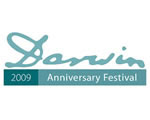 Richard Dawkins has posted the follow-up to Daniel Dennett's first report from the Darwin Festival, in which he heavily criticizes a session on evolution and theology. (Philip Clayton, Wentzel van Huyssteen, and John Brooke have since responded.) In the second installment, Dennett shares his impressions of another session he attended, this one on the evolution of religion.
Richard Dawkins has posted the follow-up to Daniel Dennett's first report from the Darwin Festival, in which he heavily criticizes a session on evolution and theology. (Philip Clayton, Wentzel van Huyssteen, and John Brooke have since responded.) In the second installment, Dennett shares his impressions of another session he attended, this one on the evolution of religion.
Here's what Dennett wrote:
The second Templeton-sponsored session (at the Cambridge Darwin Festival) was more presentable. On the evolution of religion, it featured clear, fact-filled presentations by Pascal Boyer and Harvey Whitehouse, a typical David Sloan Wilson advertisement for his multi-level selection approach, and an even more typical meandering and personal harangue from Michael Ruse. The session was chaired, urbanely and without any contentful intervention, by Fraser Watt, our evolutionary christologist. (I wonder: should “christology” be capitalized? Ian McEwan asked me if there was, perhaps, a field of X-ray christology. I’ve been having fun fantasizing about how that might revolutionize science and open up a path for the Crick and Watson of theology!)
I learned something at the session. Boyer presented a persuasive case that the “packaging” of the stew of separable and largely independent items as “religion” is itself ideology generated by the institutions, a sort of advertising that has the effect of turning religions into “brands” in competition. Whitehouse gave a fascinating short account of the Kivung cargo cult in a remote part of Papua New Guinea that he studied as an anthropologist, living with them for several years. A problem: the Kivung cult has the curious belief that their gods (departed ancestors) will return, transformed into white men, and bearing high technology and plenty for all. This does present a challenge for a lone white anthropologist coming to live with them for awhile, camera gear in hand, and wishing to be as unobtrusive as possible. Wilson offered very interesting data from a new study by his group on a large cohort of American teenagers, half Pentecostals and half Episcopalians (in other words, maximally conservative and maximally liberal), finding that on many different scales of self-assessment, these young people are so different that they would look to a biologist like “different species.” Ruse declared that while he is an atheist, he wishes that those wanting to explain religion wouldn’t start with the assumption that religious beliefs are false. He doesn’t seem to appreciate the role of the null hypothesis or the presumption of innocence in trials. We also learned tidbits about his life and his preference—as an atheist—for the Calvinist God.”



0 comments:
Post a Comment